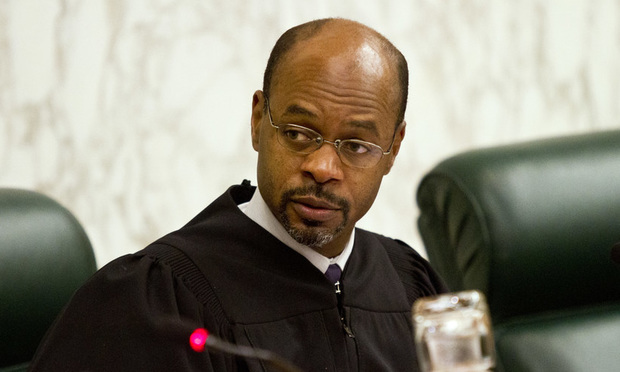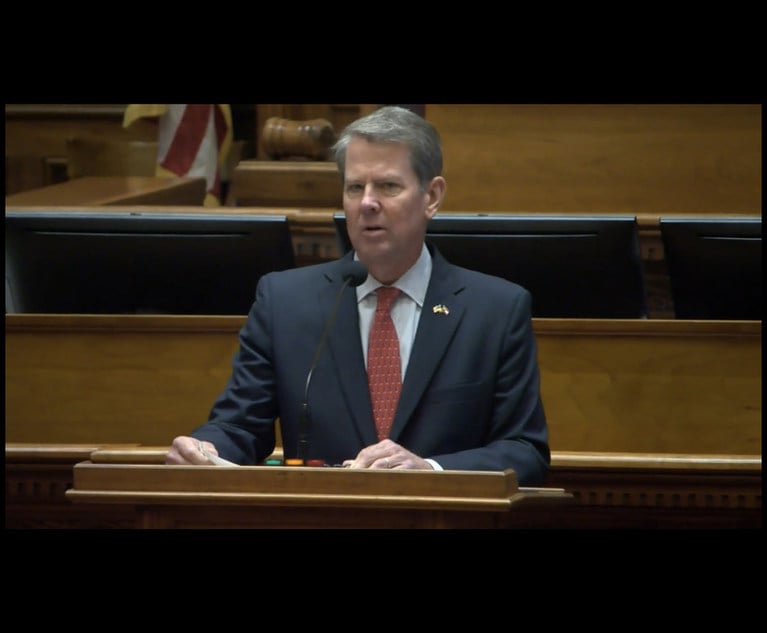Rape Conviction Survives Shield Law Attack
Chief Justice Harold Melton ruled that a trial judge erred by allowing evidence of a victim's prior sexual behavior—even though it was to help win a rape conviction. But the conviction stands.
February 04, 2019 at 04:45 PM
6 minute read
 Chief Justice Harold Melton, Supreme Court of Georgia. (Photo: John Disney/ALM)
Chief Justice Harold Melton, Supreme Court of Georgia. (Photo: John Disney/ALM)
The Georgia Supreme Court on Monday agreed with defense lawyers that the prosecutor violated the state's rape shield law by bringing up a victim's prior sexual behavior at trial, but the justices still upheld rape and sodomy convictions for crimes against three little girls.
For the defense, the decision was “another case of winning the battle and losing the war,” said Noah Pines of Ross and Pines, who handled the case with Andrew Fleischman. “But it was an important battle.”
Chief Justice Harold Melton wrote the opinion, ruling that Alcovy Judicial Circuit Superior Court Judge Samuel Ozburn erred by allowing District Attorney Layla Zon to introduce evidence that one of the victims, as a 12-year-old girl, had molested her stepsisters, starting when they were 4 and 5. Zon used that information to show how the 12-year-old, identified as S.M., came to disclose to her mother that she had been sexually abused, starting when she was in kindergarten, by her uncle, who lived with her family at the time.
The Newton County Superior Court jury found Charles White guilty in November 2014 of three counts of rape, 10 counts of child molestation, three counts of incest and other crimes against two of his nieces and his own daughter.
“Does the rape shield statute apply to the state?” Fleischman asked the high court during oral arguments in November. “I believe it does.”
Fleischman told the justices that “half a shield is worse than no shield.”
Zon—who had prosecuted the case herself and argued it as well—called the defense argument “fake outrage.” Zon said Fleischman presented a “thinly veiled argument against the admissibility of relevant evidence.”
But it was a tough day for her.
“You may have done it for nice reasons toward a noble goal, but you made a child talk about her prior sexual history—and not just a general sexual history but a criminal sexual history,” Presiding Justice David Nahmias said.
After a few more questions, Zon said she realized her arguments were “not very persuasive” and moved on.
“Lucky for me, the defense fails the plain error test,” Zon continued. “The legal error must be clear and obvious rather than subject to dispute.”
And Zon argued that White would have been convicted anyway—even without the testimony about one of his victims going on to abuse her stepsisters—because of the two other children.
In the end, the court agreed with both Fleischman and Zon on some points.
“We conclude that the trial court erred by admitting into evidence testimony regarding S.M.'s sexual behavior,” Melton said. But he added that the trial judge's action did not amount to “plain error” that would require reversal of White's convictions.
“We do not find that the error here 'likely affected' the outcome of the trial court proceedings,” Melton said. The ruling upheld the Court of Appeals ruling affirming the convictions but took issue with the reasoning.
“Regardless of the State's possible desire to introduce evidence of a complaining witness's past sexual history to support its theory of a case against a defendant (as was the case here) or for some other purpose, there is simply no additional exception written into the statute to allow the State to do so, and this Court cannot write such an exception into the statute for the State,” Melton said.
“The introduction of S.M.'s prior sexual behavior was not to further victimize her, but to expose potential wrongdoing by White,” Melton said in a footnote. “However, the plain language of Georgia's Rape Shield law would not allow for the admission of such evidence because the State cannot introduce evidence of a victim's past sexual behavior.”
While an argument could be made for policy reasons to “allow the State to introduce evidence of a victim's past sexual behavior in certain circumstances, we cannot rewrite Georgia's Rape Shield law to allow the State to do so,” Melton said. “We must leave that job to the General Assembly.”
Justice Charlie Bethel—who until last year was on the Georgia Court of Appeals and before that was in the Georgia State Senate—wrote a special concurrence.
“Although I agree with the outcome reached in this case, I find myself unsettled and uneasy with the majority's determination … that the error here did not likely affect the outcome of the trial court proceedings,” Bethel said. “While I cannot categorically say that determination is incorrect, I am troubled by the suggestion that defense counsel's skillful handling of the improperly introduced evidenced sufficiently mitigated the prejudice of the evidence. I fully concur with the balance of the majority opinion, but because White failed to demonstrate that the error resulted in an outcome that seriously affected the fairness, integrity, or public reputation of judicial proceedings, I would base the Court's conclusion in this case on White's failure to satisfy that prong of the four-part plain-error analysis.”
Bethel said he could not “say with confidence that a jury would have returned the same verdict” on the charges for the child called S.M.
“What I can say with confidence is that White's conviction does not seriously affect the fairness, integrity, or public reputation of judicial proceedings nor does upholding the conviction risk a miscarriage of justice,” Bethel added. “Georgia's version of the Rape Shield Statute exists for the protection of the witness. Nothing about the admission of the evidence here threatened White's right to a fair or constitutional trial.”
The court's ruling was good news to Zon—and a call for legislative action.
“This decision was very well reasoned and what I expected based upon the plain language of the statute,” Zon said. “The General Assembly adopted the new evidence code in 2011, which became effective in 2013, but it did not adopt the exception that the federal counterpart has to provide a mechanism for prosecutors to introduce such evidence. As the Court recognized, good policy reasons exist to allow the State to introduce evidence of a victim's past sexual behavior in order to better prove the charges.”
Son said she is “pleased that the convictions were affirmed against Mr. White in our specific case.” She added, “I will be working with my colleagues to ensure that legislation is proposed to the General Assembly to provide for a prosecutor exception.”
The case is White v. State, No. S18G0365.
This content has been archived. It is available through our partners, LexisNexis® and Bloomberg Law.
To view this content, please continue to their sites.
Not a Lexis Subscriber?
Subscribe Now
Not a Bloomberg Law Subscriber?
Subscribe Now
NOT FOR REPRINT
© 2025 ALM Global, LLC, All Rights Reserved. Request academic re-use from www.copyright.com. All other uses, submit a request to [email protected]. For more information visit Asset & Logo Licensing.
You Might Like
View All
Panel to Decide if Governor Should Suspend Georgia Lawyer From Elected Post
4 minute read
Big Tech Is Cozying Up to President Trump. Here's Why Their Lawyers Are Cautiously Optimistic

Trending Stories
- 1In Novel Oil and Gas Feud, 5th Circuit Gives Choice of Arbitration Venue
- 2Jury Seated in Glynn County Trial of Ex-Prosecutor Accused of Shielding Ahmaud Arbery's Killers
- 3Ex-Archegos CFO Gets 8-Year Prison Sentence for Fraud Scheme
- 4Judges Split Over Whether Indigent Prisoners Bringing Suit Must Each Pay Filing Fee
- 5Law Firms Report Wide Growth, Successful Billing Rate Increases and Less Merger Interest
Who Got The Work
J. Brugh Lower of Gibbons has entered an appearance for industrial equipment supplier Devco Corporation in a pending trademark infringement lawsuit. The suit, accusing the defendant of selling knock-off Graco products, was filed Dec. 18 in New Jersey District Court by Rivkin Radler on behalf of Graco Inc. and Graco Minnesota. The case, assigned to U.S. District Judge Zahid N. Quraishi, is 3:24-cv-11294, Graco Inc. et al v. Devco Corporation.
Who Got The Work
Rebecca Maller-Stein and Kent A. Yalowitz of Arnold & Porter Kaye Scholer have entered their appearances for Hanaco Venture Capital and its executives, Lior Prosor and David Frankel, in a pending securities lawsuit. The action, filed on Dec. 24 in New York Southern District Court by Zell, Aron & Co. on behalf of Goldeneye Advisors, accuses the defendants of negligently and fraudulently managing the plaintiff's $1 million investment. The case, assigned to U.S. District Judge Vernon S. Broderick, is 1:24-cv-09918, Goldeneye Advisors, LLC v. Hanaco Venture Capital, Ltd. et al.
Who Got The Work
Attorneys from A&O Shearman has stepped in as defense counsel for Toronto-Dominion Bank and other defendants in a pending securities class action. The suit, filed Dec. 11 in New York Southern District Court by Bleichmar Fonti & Auld, accuses the defendants of concealing the bank's 'pervasive' deficiencies in regards to its compliance with the Bank Secrecy Act and the quality of its anti-money laundering controls. The case, assigned to U.S. District Judge Arun Subramanian, is 1:24-cv-09445, Gonzalez v. The Toronto-Dominion Bank et al.
Who Got The Work
Crown Castle International, a Pennsylvania company providing shared communications infrastructure, has turned to Luke D. Wolf of Gordon Rees Scully Mansukhani to fend off a pending breach-of-contract lawsuit. The court action, filed Nov. 25 in Michigan Eastern District Court by Hooper Hathaway PC on behalf of The Town Residences LLC, accuses Crown Castle of failing to transfer approximately $30,000 in utility payments from T-Mobile in breach of a roof-top lease and assignment agreement. The case, assigned to U.S. District Judge Susan K. Declercq, is 2:24-cv-13131, The Town Residences LLC v. T-Mobile US, Inc. et al.
Who Got The Work
Wilfred P. Coronato and Daniel M. Schwartz of McCarter & English have stepped in as defense counsel to Electrolux Home Products Inc. in a pending product liability lawsuit. The court action, filed Nov. 26 in New York Eastern District Court by Poulos Lopiccolo PC and Nagel Rice LLP on behalf of David Stern, alleges that the defendant's refrigerators’ drawers and shelving repeatedly break and fall apart within months after purchase. The case, assigned to U.S. District Judge Joan M. Azrack, is 2:24-cv-08204, Stern v. Electrolux Home Products, Inc.
Featured Firms
Law Offices of Gary Martin Hays & Associates, P.C.
(470) 294-1674
Law Offices of Mark E. Salomone
(857) 444-6468
Smith & Hassler
(713) 739-1250







